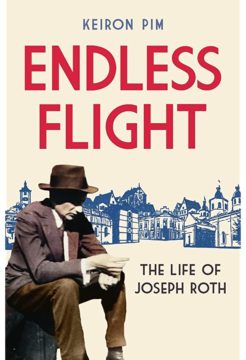Katrina Goldstone at the Dublin Review of Books:
 When Joseph Roth died in penury in Paris in 1939, he left little behind. No trace of his collection of penknives, watches, walking canes and clothes bought for him by Stefan Zweig. The knives had been gathered to protect himself from both imagined and very real enemies. Soon after war’s end, his cousin visited one of his translators, Blanche Gidon, and was presented with “an old worn out coupe case”. Within it was a treasure trove ‑ some manuscripts, never published in his lifetime, books and letters. Throughout the long dark night of Nazi occupation Gidon had kept it hidden under the bed of the concierge. There have been other custodians of Roth’s reputation along the way, Hermann Kesten, a friend, and Roth’s translator, Michael Hofmann. Yet his literary significance was often ignored. Roth had been an early and vocal critic of Hitlerism. His masterpiece, The Radetsky March, had been among the first books committed for incendiary destruction when the Nazis came to power. Yet, as this magisterial biography by Kieron Pim shows, the phrase “man of many contradictions” is scarcely fit for purpose when trying to grapple with the complex contrarian Moses Joseph Roth. If Joseph Roth hadn’t been born, he’d have been invented, as a picaresque character in a novel probably by an impoverished disillusioned Mitteleuropa writer fleeing from Nazi Germany for his life.
When Joseph Roth died in penury in Paris in 1939, he left little behind. No trace of his collection of penknives, watches, walking canes and clothes bought for him by Stefan Zweig. The knives had been gathered to protect himself from both imagined and very real enemies. Soon after war’s end, his cousin visited one of his translators, Blanche Gidon, and was presented with “an old worn out coupe case”. Within it was a treasure trove ‑ some manuscripts, never published in his lifetime, books and letters. Throughout the long dark night of Nazi occupation Gidon had kept it hidden under the bed of the concierge. There have been other custodians of Roth’s reputation along the way, Hermann Kesten, a friend, and Roth’s translator, Michael Hofmann. Yet his literary significance was often ignored. Roth had been an early and vocal critic of Hitlerism. His masterpiece, The Radetsky March, had been among the first books committed for incendiary destruction when the Nazis came to power. Yet, as this magisterial biography by Kieron Pim shows, the phrase “man of many contradictions” is scarcely fit for purpose when trying to grapple with the complex contrarian Moses Joseph Roth. If Joseph Roth hadn’t been born, he’d have been invented, as a picaresque character in a novel probably by an impoverished disillusioned Mitteleuropa writer fleeing from Nazi Germany for his life.
more here.
